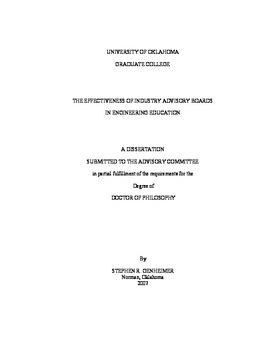| dc.contributor.advisor | Shehab, Randa L., | en_US |
| dc.contributor.author | Genheimer, Stephen R. | en_US |
| dc.date.accessioned | 2013-08-16T12:20:54Z | |
| dc.date.available | 2013-08-16T12:20:54Z | |
| dc.date.issued | 2007 | en_US |
| dc.identifier.uri | https://hdl.handle.net/11244/1259 | |
| dc.description.abstract | The use of voluntary advisory boards composed primarily of industry practitioners to give aid and advice is almost universal in engineering education programs. The goals, operation, and composition of advisory boards have significant variation across programs. Some schools have established valued and effective advisory boards while others struggle with poor working relationships and difficulty accomplishing their objectives. This research develops a model of advisory board effectiveness, and through interviews and surveys validates that model and identifies common elements of effective advisory boards. | en_US |
| dc.description.abstract | Interviews with school leadership and board members from two engineering programs, along with observation of board meetings and review of documents, led to a case study in which the operation of an effective advisory board was examined. In addition, a survey was sent out to school directors and board members at engineering programs across the United States asking for information regarding the effectiveness, operation, and composition of their advisory boards. The case study and survey analyses led to a series of conclusions regarding the common elements of advisory board effectiveness. | en_US |
| dc.description.abstract | Significant differences are seen between programs in the role of the advisory board with respect to fundraising. Some programs deliberately do not involve the board in any aspects of fundraising, while others use the board very successfully in this role. For some programs, however, fundraising is a source of conflict and frustration. Boards can be effective with or without involvement of board members in fundraising, but it is essential that expectations in this area be clearly understood and agreed upon by the school and the board. | en_US |
| dc.description.abstract | Effective boards are characterized by strong leadership, both from the school director and board chair. These boards tend to have membership typified by individuals with relevant work experience, a strong desire for involvement with the program, and close ties to the school. A high percentage of members are typically alumni of the program. Membership represents a diversity of industry and work experience, though not to the extent that members feel uncomfortable in the board environment. Board operation encourages engagement of board members with students, provides opportunities for socialization between board members and with faculty, and has formal procedures for involvement of the board in the ABET accreditation process. The school maintains open and candid communication with board members and consistently follows up on actions from the board. Advisory board activities are coordinated with the rest of the college or university. | en_US |
| dc.description.abstract | Based on the literature of organizational effectiveness, a model of advisory board effectiveness is proposed. This model suggests that effectiveness should be considered in four dimensions - Human Relations (the working relationships within the board), Internal Process (the internal operating systems needed for board operation), Rational Goal (the goals and objectives of the board), and Open Systems (the interaction of the board with the surrounding world). The research validates this model and supports its usefulness as a framework for understanding and improving advisory board operation. | en_US |
| dc.format.extent | xiii, 240 leaves : | en_US |
| dc.subject | Advisory boards. | en_US |
| dc.subject | Education, Higher. | en_US |
| dc.subject | Engineering Study and teaching. | en_US |
| dc.subject | Academic-industrial collaboration. | en_US |
| dc.subject | Engineering, Industrial. | en_US |
| dc.title | The effectiveness of industry advisory boards in engineering education. | en_US |
| dc.type | Thesis | en_US |
| dc.thesis.degree | Ph.D. | en_US |
| dc.thesis.degreeDiscipline | School of Industrial and Systems Engineering | en_US |
| dc.note | Source: Dissertation Abstracts International, Volume: 68-10, Section: B, page: 6887. | en_US |
| dc.note | Adviser: Randa L. Shehab. | en_US |
| ou.identifier | (UMI)AAI3283845 | en_US |
| ou.group | College of Engineering::School of Industrial and Systems Engineering | |
